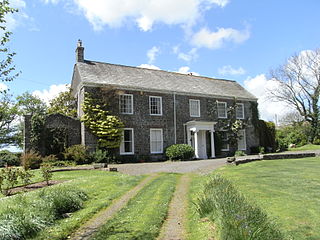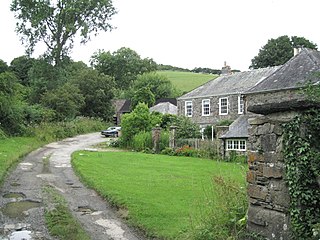Related Research Articles
Richard Fitz Turold was an eleventh-century Anglo-Norman landowner in Cornwall and Devon, mentioned in the Domesday Book. In the 13th century his estates formed part of the Feudal barony of Cardinham, Cornwall, and in 1166 as recorded in the Cartae Baronum his estates had been held as a separate fiefdom from Reginald, Earl of Cornwall.

Swimbridge is a village, parish and former manor in Devon, England. It is situated 4 miles (6.4 km) south-east of Barnstaple and twinned with the town of St.Honorine Du Fay in Normandy, France. It was the home of the Rev. John "Jack" Russell who first bred the Jack Russell Terrier.
Milton Damerel is a village, parish and former manor in north Devon, England. Situated in the political division of Torridge, on the river Waldon, it covers 7 square miles (18 km2). It contains many tiny hamlets including Whitebeare, Strawberry Bank, East Wonford and West Wonford. The parish has a population of about 450. The village is situated about 5 miles (8.0 km) from Holsworthy, 13.081 miles (21.052 km) from Bideford and 22.642 miles (36.439 km) from Barnstaple. The A388 is the main road through the parish.

Collaton St Mary is a village, parish and former manor in Devon, England, situated about 2 miles (3 km) west of the town of Paignton. The village is bisected by the A385 Paignton to Totnes road. The parish is now administered within the unitary authority of Torbay, Devon.

South Radworthy is a hamlet in the civil parish of North Molton, in the North Devon District of the county of Devon, England. It is about three miles to the north of the village of North Molton and about fifteen miles to the east of the town of Barnstaple. The hamlet sits on an unclassified road and is surrounded by woodland.

Halwell and Moreleigh is a civil parish in Devon, England. It comprises the villages of Halwell and Moreleigh.
William Cheever was one of the 52 Devon Domesday Book tenants-in-chief of King William the Conqueror. He held 46 landholdings in Devon. His lands later formed, the feudal barony of Bradninch, Devon. His brother was Ralph de Pomeroy, feudal baron of Berry Pomeroy, Devon, with whom several of his holdings had been divided into two parts, one for each brother. His sister was Beatrix, who held from him the manor of Southleigh.

The feudal barony of Plympton was a large feudal barony in the county of Devon, England, whose caput was Plympton Castle and manor, Plympton. It was one of eight feudal baronies in Devonshire which existed during the medieval era. It included the so-called Honour of Christchurch in Hampshire, which was not however technically a barony. The de Redvers family, first holders of the barony, were also Lords of the Isle of Wight, which lordship was not inherited by the Courtenays, as was the barony of Plympton, as it had been sold to the king by the last in the line Isabel de Redvers, 8th Countess of Devon (1237–1293).

Thuborough in the parish of Sutcombe, Devon, England, is an historic estate, formerly a seat of a branch of the Prideaux family, also seated at Orcharton, Modbury; Adeston, Holbeton; Soldon, Holsworthy; Netherton, Farway; Ashburton; Nutwell, Woodbury; Ford Abbey, Thorncombe, all in Devon and at Prideaux Place, Padstow and Prideaux Castle, Luxulyan, in Cornwall. The present mansion house, comprising "Thuborough House" and "Thuborough Barton", the north-east block, is a grade II listed building.
Robert of Aumale was one of the Devon Domesday Book tenants-in-chief of King William the Conqueror (1066–1087). His lands, comprising 17 entries in the Domesday Book of 1086, later formed part of the very large Feudal barony of Plympton, whose later barons were the Courtenay family, Earls of Devon.
Ralph de Pomeroy was one of the 52 Devon Domesday Book tenants-in-chief of King William the Conqueror and was the first feudal baron of Berry Pomeroy in Devon. He held 58 landholdings in Devon.
Gotshelm was an Anglo-Norman magnate and one of the 52 Devon Domesday Book tenants-in-chief of King William the Conqueror and was also a Cornwall Domesday Book tenant-in-chief. He is listed in the Domesday Book of 1086 as holding 28 estates or manors in Devon from the king. His brother was Walter de Claville, also a Devon Domesday Book tenant-in-chief, who held 32 estates or manors in Devon from the king.

Washfield is a village, parish and former manor in Devon, England, situated about 2 miles north-west of Tiverton. The parish church is dedicated to St Mary the Virgin. It was within the jurisdiction of the historic West Budleigh Hundred.
Ansger of Montacute was one of the Devon Domesday Book tenants-in-chief of King William the Conqueror.

Widworthy is a village, parish and former manor in Devon, England. The village is 3 1/2 miles east of Honiton and the parish is surrounded clockwise from the north by the parishes of Stockland, Dalwood, Shute, Colyton, Northleigh, and Offwell. The parish church is dedicated to St Cuthbert. Near the church is Widworthy Barton, the former manor house, which is largely unaltered from its early 17th century form. Widworthy Court is a mansion within the parish built in 1830 by Sir Edward Marwood Elton to the design of G.S. Repton.
Theobald FitzBerner, was an Anglo-Norman warrior and magnate, one of the Devon Domesday Book tenants-in-chief of King William the Conqueror. The Domesday Book of 1086 lists him as the holder of 27 manors in Devon. His lands later formed part of the Feudal barony of Great Torrington, together with lands of his son-in-law Odo FitzGamelin

Luscombe is an historic estate situated in the parish of Rattery in Devon.
Algar was an Anglo-Saxon personal name, frequently mentioned in the Domesday Book of 1068. it is impossible to determine whether the many mentions of the name in that record refer to a single person or to several people of the same name. Some mentions of the name have an identifying suffix, such as "Algar Long" and "Algar the Priest".

Hareston is an historic estate in the parish of Brixton, about three miles from Plymouth in Devon. The mansion house built during the reign of King Henry VII (1485-1509) burned down partially in an accidental fire at the beginning of the 18th century, and in 1822 the surviving part, the Hall and Chapel, was being used as a farmhouse. It was described by Candida Lycett Green in her 1991 book The Perfect English Country House as: "The most forgotten Manor House Farm In England, untouched for hundreds of years, sits safely, impossible to find, down miles of private sunken lanes which in the spring brim with Campion, Bluebells, Purple Orchids, Primroses, Violets, Speedwell and Stitchwort. Wooded hills rise behind this, the quintessence of an ancient English Manor House".
Nicholas the Bowman, also known as Nicholas de la Pole, was a servant of King William the Conqueror (1066-1087) and was one of that king's Devon Domesday Book tenants-in-chief. He was also a tenant-in-chief in Warwickshire and at some time between 1095 and 1100 he exchanged his manor of Ailstone in Warwickshire for the manor of Plymtree in Devon, held by St Peter's Abbey, Gloucester.
References
- ↑ As his name appears in the Domesday Book (with genitive form Alvredi Britonis) Thorn, Caroline & Frank, (eds.) Domesday Book, (Morris, John, gen.ed.) Vol. 9, Devon, Parts 1 & 2, Phillimore Press, Chichester, 1985, Part 1, Chapter 39
- ↑ Thorn, Caroline & Frank, (eds.) Domesday Book, (Morris, John, gen.ed.) Vol. 9, Devon, Parts 1 & 2, Phillimore Press, Chichester, 1985, Part 2 (Notes), Chapter 39:1-22
- ↑ Thorn & Thorn, 35:4
- ↑ Thorn & Thorn, Part 2 (notes), Chapter 39